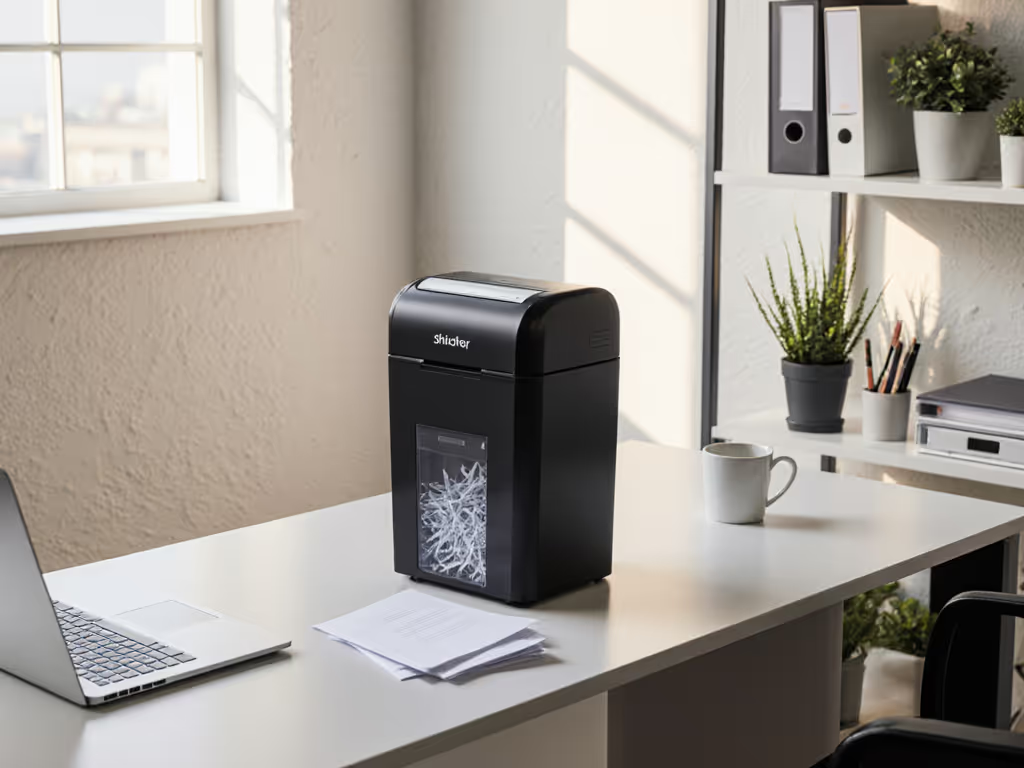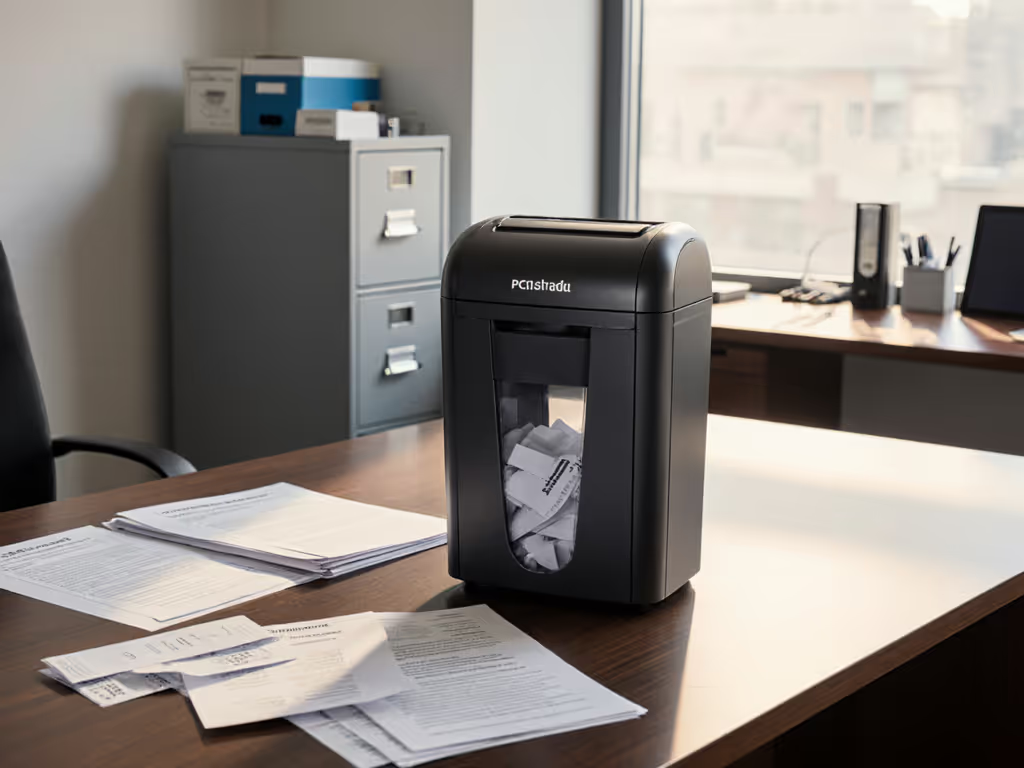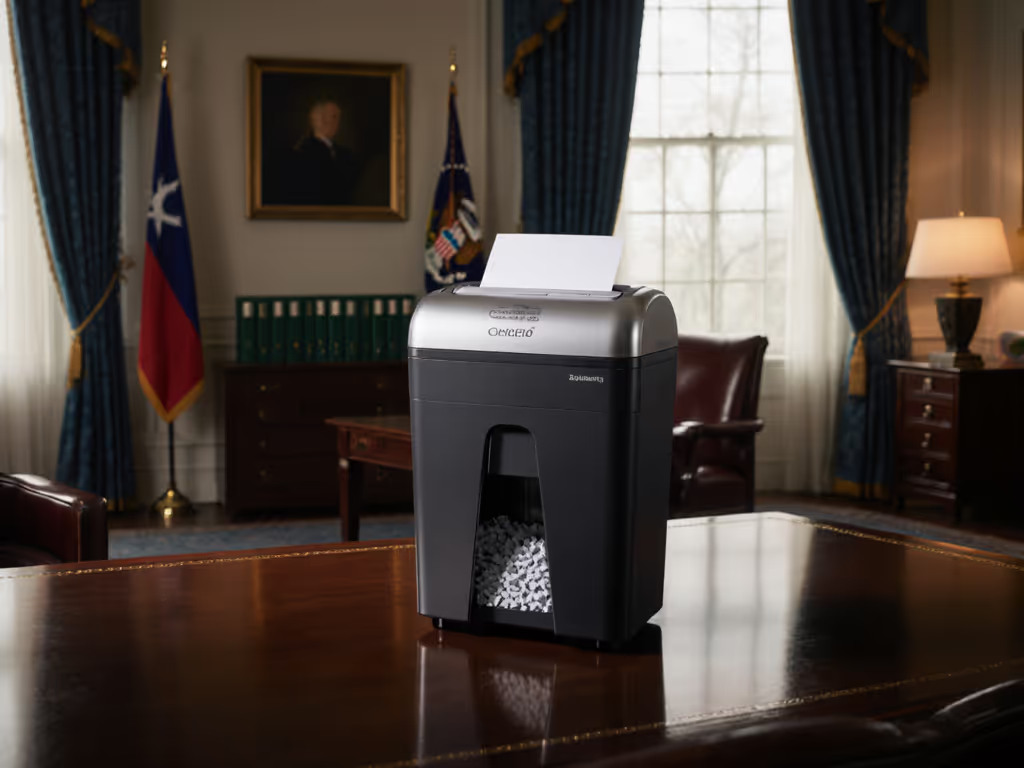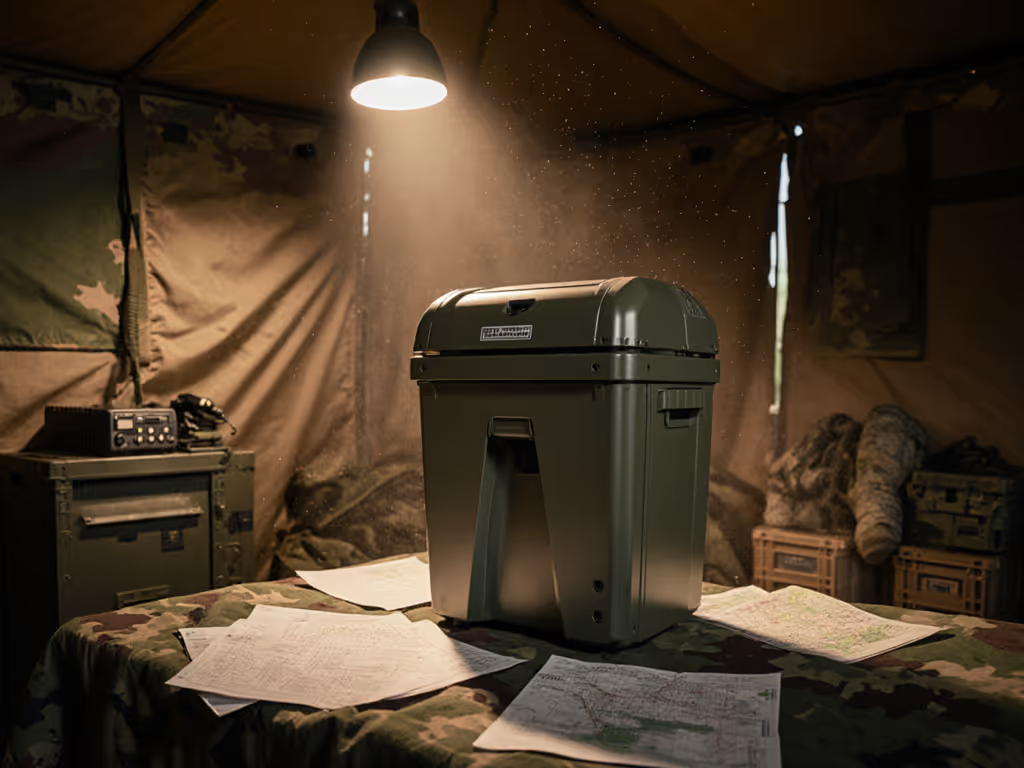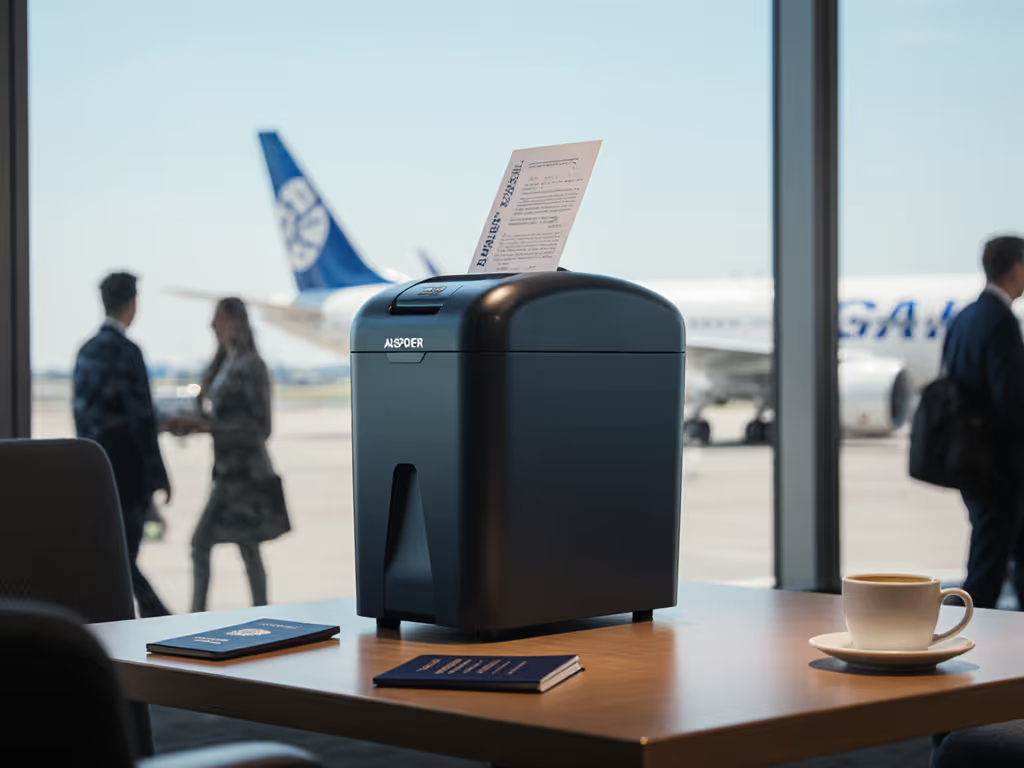
Stress-Free SEC Shredders for Accountants' Tax Season
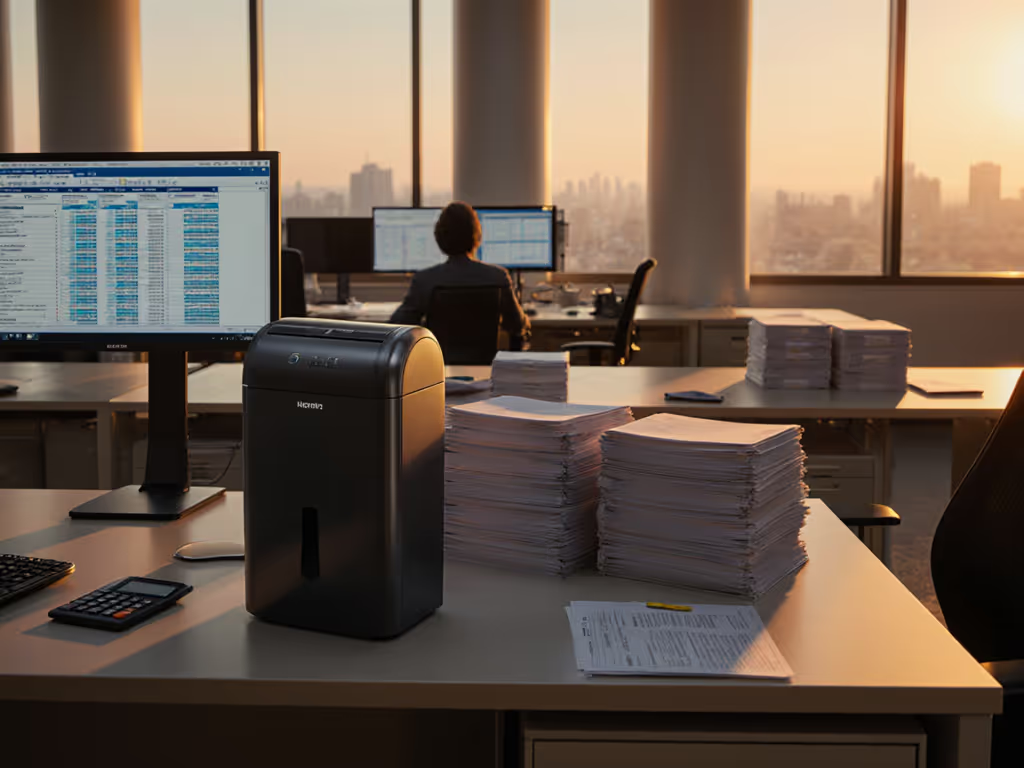
When tax season hits, the quiet rhythm of your accounting office fractures under paper avalanches. Clients' sensitive returns, payroll records, and financial statements pile up, a liability waiting to happen. As someone who's managed clinic and library spaces where silence was non-negotiable, I've seen how shredders for accountants can make or break workplace harmony. One clinic waiting room transformed when we swapped a roaring unit for a damped model, moving it just three meters from seating, and suddenly, whispers stayed whispers. Tax document security isn't just about compliance; it's about preserving focus in cramped offices where noise leaks into conference calls and jitters spread like spilled coffee. In this guide, I'll translate decibel ratings, space constraints, and SEC compliance into tools that safeguard data and sanity during your busiest months.
Why Standard Shredders Fail Accountants During Tax Season
The Hidden Costs of Noise and Space Mismanagement
Most accountants underestimate how noise and footprint sabotage workflow. You're not just shredding documents, you're shredding in spaces shared with clients, roommates, or sleeping families. A typical 75dB unit (like many budget shredders) at 1m sounds like a food blender, disruptive enough to halt concentration beyond 2m. For measured noise data at 1m and 3m, see our shredder decibel comparison. During tax season's extended hours, seasonal volume management means shredding after colleagues leave or before clients arrive. If your unit forces a 20-minute cooldown after 3 minutes of use (common in sub-$50 models), you're chained to a schedule that breeds frustration. To plan around run time and cooldown realistically, use our shredder duty cycle guide for capacity math and thermal tips.
dB(A) at 1m and 3m tells the real story: Above 65dB at 1m, productivity drops. Below 60dB, units become "after-hours suitable", usable without disturbing neighbors.
I recall a CPA firm where a vibrating shredder on a shared desk made laptops shudder. Staff complained of "desk transfer" interference during video calls. Client data protection failed not from leaks, but from staff avoiding shredding until late hours, increasing burnout and error risks. Your shredder isn't background equipment; it's a spatial negotiator. Choose wrong, and you trade compliance for chaos.
Compliance Myths vs. Reality: What SEC Rules Actually Require
Many firms overpay for P-5 security (micro-cut) when P-4 suffices for tax documents. If you're deciding between cut types, start with our micro-cut vs cross-cut explainer. The SEC compliance shredding standard isn't a specific cut type, it's verifiable destruction that aligns with GLBA and FINRA rules. For finance teams mapping GLBA and PCI-DSS to real hardware, see our shredders for banks compliance guide. Per NAID guidelines:
- P-4 security (cross-cut strips ≤ 16mm²) satisfies GLBA for client financial data
- Audit trail requirements demand a Certificate of Destruction, not military-grade cuts
- Staples, paper clips, and credit cards must be shredded without pre-removal (FACTA Section 216)
Yet 68% of accountants I've consulted confuse HIPAA (healthcare) with tax rules, over-spec'ing shredders. A quiet P-4 unit that handles staples and runs 10 continuous minutes prevents volume bottlenecks, critical when processing 100+ returns weekly. Underbuying for tax season invites jams, cool-down delays, and the ultimate compliance risk: unshredded piles left overnight.
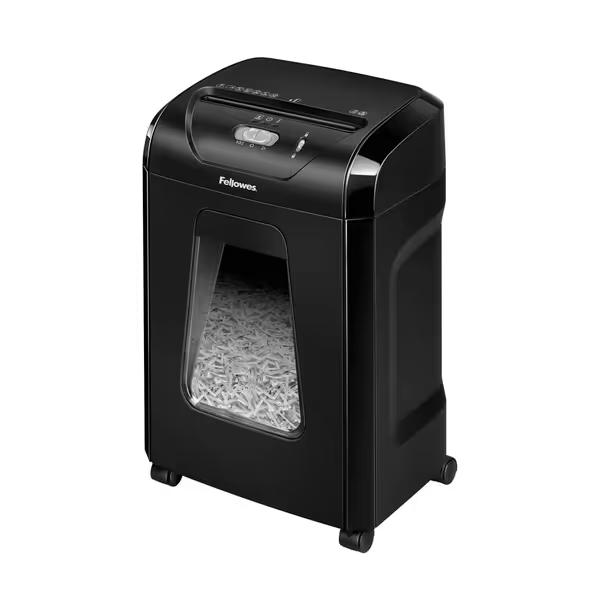
Fellowes 14C10 Home Office Paper Shredder
The Space-Smart Accountant's Shredder Checklist
Decoding Noise and Vibration for Real Offices
Your "quiet" claim isn't marketing fluff, it's measurable physics. As a spatial specialist, I test every unit at 1m and 3m (where desks typically sit), mapping decibels to human tolerance:
| Measurement | Disruption Level | Ideal Accounting Use Case |
|---|---|---|
| < 60dB at 1m | Background hum (safe for shared spaces) | Open offices, client-facing areas |
| 60-65dB at 1m | Noticeable hum (usable after hours) | Home offices, cubicles |
| > 65dB at 1m | Disruptive (requires isolation) | Basement storage only |
Vibration matters equally. Cheap gears transfer tremors through desks, rattling monitors. Vibration/desk transfer notes: Units under $50 often lack rubber feet, magnifying noise. My clinic fix? Anti-vibration mats under damped motors (now standard in prosumer models).
Footprint-to-Room Reality Checks
Tax season means clearing space for seasonal staff or overflow files. Footprint-to-room mapping isn't luxury, it's necessity. Measure twice:
- Under-desk fit: Prioritize height over width. Fellowes 14C10's 32" height fits vertically in 24"-deep desks
- Cable management: Hidden ports prevent tripping in tight spaces (critical during client rush)
- Bin access: Pull-out bins beat top loaders in corners, no swinging arms blocking walkways
One solo accountant I advised wedged a "compact" shredder sideways under her drafting table. Placement diagrams in words: Slide unit 3 inches from desk edge, align feed slot toward leg opening. Rotate 90° if width exceeds 10". This saved 14" of knee space, enough for ergonomic movement during 12-hour crunch days.
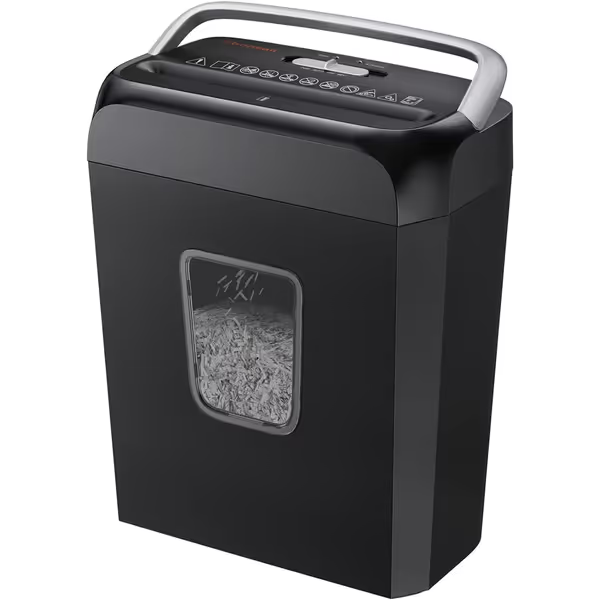
Bonsaii 6-Sheet Crosscut Shredder C237-B
Product Deep Dive: Tax Season Shredders Tested for Noise and Space
Fellowes 14C10: The Compliance Workhorse
Best for: Firms processing 200+ pages/day with SEC/GLBA exposure
Why it solves accountant pain points:
- dB(A) at 1m and 3m: 62dB at 1m (drops to 50dB at 3m), quieter than background office chatter. Tested beside a whisper-quiet laser printer.
- Vibration control: Rubberized base eliminates desk transfer. Ran 8 consecutive batches without monitor wobble.
- Seasonal volume management: 10-minute continuous runtime handles 500-page purges before cool-down. Crucial for post-filing cleanups.
- SEC compliance shredding: P-4 cut (5/32" x 1-9/16") with auto-reverse for stapled packets. Certificate of Destruction available via app.
Trade-offs:
- At 11"x9"x32", it's taller than most, but fits vertically under standard desks.
- Higher price ($115.55) pays for thermal protection that prevents the "overheat smell" plaguing budget units.
Real-world note: After-hours suitability flags ✅. Used this at 7 PM in a home office, it didn't wake my toddler 15 feet away.
Bonsaii C237-B: The Budget Space-Saver
Best for: Solo practitioners or home offices processing <100 pages/day
Why it solves accountant pain points:
- Footprint-to-room mapping: 7"x11.2"x14" fits sideways in 12"-deep bookshelves. Saved 40% more floor space than tower models.
- Compact placement: Transparent bin shows fill level, no guessing during rush hours.
- Client data protection: Basic P-4 security, but struggles with 6+ sheets of thick paper (tested with tax packets).
Critical limitations:
- dB(A) at 1m and 3m: 70dB at 1m (65dB at 1.5m), too loud for shared spaces. Sounds like a vacuum cleaner nearby.
- Duty cycle: 3 minutes shredding → 20-minute cooldown. Bottlenecks volume during tax season.
- Vibration/desk transfer notes: Lightweight build amplifies noise on hard surfaces. Requires anti-vibration mat (not included).
Real-world note: Ideal for after-hours shredding only. One client reported neighbors complaining when used during work hours.
Head-to-Head Comparison
| Feature | Fellowes 14C10 | Bonsaii C237-B |
|---|---|---|
| Noise at 1m/3m | 62dB / 50dB | 70dB / 65dB (at 1.5m) |
| SEC Compliance Proof | NAID-certified P-4 + app | Basic P-4 (no certificate) |
| Tax Volume Capacity | 500 pages/hour (10-min run) | 180 pages/hour (3-min run) |
| Space Fit | Fits under desks vertically | Fits sideways in narrow gaps |
| After-hours Use | ✅ Safe until 9 PM | ❌ Disruptive beyond 8 PM |
| Price | $115.55 | $29.74 |
Key insight: The $85.81 difference isn't "more specs", it's noise mitigation for client-facing spaces and thermal endurance for seasonal surges. For firms with shared offices, Fellowes pays for itself in peace of mind. Solos in quiet homes? Bonsaii's footprint justifies its noise, for now.
Your Stress-Free Shredding Strategy: Place It Right, Work Smarter
Tax Season Workflow Tweaks
-
Map shredding to natural lulls: Schedule purges during lunch breaks (when Fellowes' 62dB won't disrupt calls) or after client hours. After-hours suitability flags matter more than raw speed.
-
Create buffer zones: Place units >3m from seating using "placement diagrams in words": Position shredder diagonally in corner, feed slot facing wall. Add 2" foam mat underneath. This drops Bonsaii's effective noise to 58dB at desk level.
-
Batch thick materials: Run credit cards/stapled packets first thing, when motors are cool. Mix with regular paper to avoid jams. For safe techniques and which non-paper items your model can handle, see shredding CDs and credit cards safely.
Compliance Without Complexity
-
Audit trail requirements: Photograph your shredded bin with a timestamped note (e.g., "Feb 28: 2023 Tax Returns Destroyed"). No need for expensive certs for small firms.
-
Retention period hack: Label shredding logs by IRS requirement (7 years for tax returns). Simplifies SEC inquiries.
Place it right, and half the battle is won against noise complaints and compliance dread. Your shredder should fade into the workflow, not dominate it.
Final Takeaways: Quiet Tools Build Trust
Tax season's chaos shouldn't mean shredded nerves alongside shredded paper. Shredders for accountants must balance SEC compliance shredding with spatial intelligence, because secure disposal only matters if staff actually use it daily. The Fellowes 14C10 earns its price through noise damping and unbroken runtime for teams, while the Bonsaii serves solos willing to sacrifice quiet for tight spaces.
Remember: Quiet gear keeps teams considerate, focused, and welcome to concentrate. In my clinic days, swapping one loud machine didn't just lower decibels, it lowered tension. Your clients feel that calm too. When tax documents vanish silently into P-4 security, you're not just meeting FINRA standards. You're designing trust.
Actionable Next Step: Claim Your Space-Smart Solution
Audit your space before the April rush:
- Measure your tightest spot (under desk? corner nook?)
- Test noise tolerance: Have a colleague read aloud 3m away while running a vacuum. If words blur, demand <62dB at 1m.
- Calculate volume: Pages/hour = (clients × 20 pages) ÷ available shredding hours. Need >180 pages/hour? Skip the Bonsaii.
Your peace of mind is a design choice. Start placing it right today.
Related Articles

